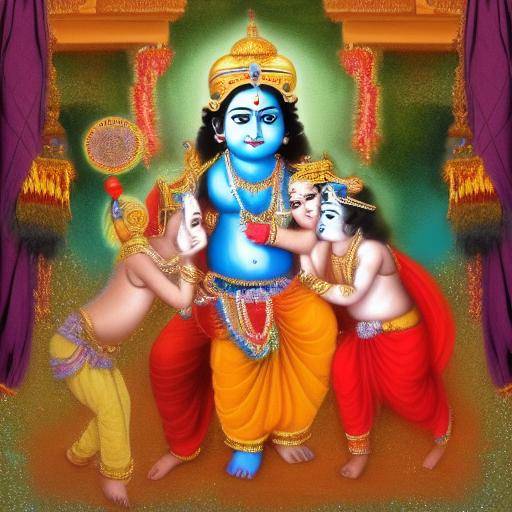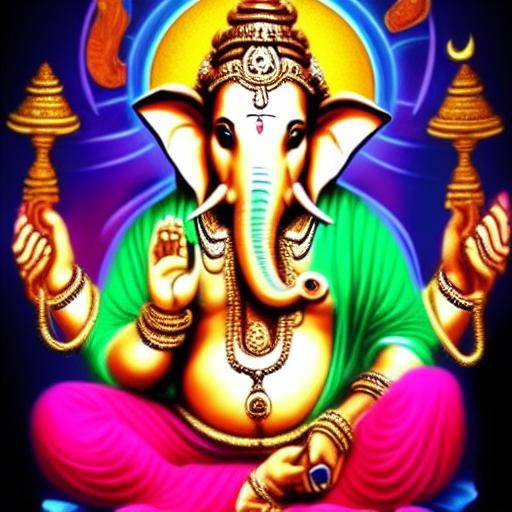
In the rich pantheon of Hindu deities, the Nagas occupy a special place like divine serpents. Their presence is vibrant and powerful, and their meaning extends beyond what their serpentine forms might suggest. In this article, we will explore the deep connection of the Nagas with Hinduism, its influence on Indian culture and its symbolism in spirituality. As we unravel the mystery of the Nagas, we will discover its remarkable presence in the mythology, religious traditions and everyday life of India.
History and Origins of the Nagas in the Hindu Mythology
The Nagas have been part of India's rich mythological tradition for millennia. Their presence dates back to the oldest sacred texts, such as the Vedas, where they are mentioned as powerful serpent-shaped beings who reside in the depths of the Earth and control the underground waters. Over time, the Nagas became worshiped deities, associated with fertility, water and wisdom.
In Hindu mythology, it is reported that the Nagas descend from the wise Kashyapa and his wife Kadru. These divine beings possess a fascinating duality, as they are sometimes portrayed as benevolent protectors of hidden treasures and knowledge, while on other occasions, they are shown as fearsome deities capable of inflicting severe punishment on transgressors.
The evolution of the Nagas as divine entities reflects the deep attachment of Indian culture to nature and its reverence for ancestral wisdom. Through the stories and legends in which the Nagas appear, the interconnection between religious devotion, the importance of water as a vital resource and the value of the wisdom transmitted from generation to generation is revealed.
Symbolism of the Nagas in Hindu Spirituality
The symbolism associated with the Nagas is vast and complex, covering both positive and negative aspects of Hindu spirituality. They are considered guardians of the hidden treasures and protectors of the springs and bodies of water. This connection with water highlights the importance of the Nagas in the preservation and flow of this vital resource, something fundamental in a land with a long agricultural tradition.
In addition, the Nagas are symbols of ancestral wisdom and secret knowledge. They are closely related to spiritual alchemy and the capacity for transformation, which makes them central figures in the search for enlightenment and understanding of the mysteries of the universe. The image of the serpent is displayed as a reminder that the path to wisdom and self-realization can be sinuous and full of challenges, but also offers a promise of personal renewal and growth.
The Nagas in Popular Culture and Celebrations
The influence of the Nagas extends far beyond the pages of ancient religious texts. In contemporary India, the presence of the Nagas is manifested in festivals and rituals dedicated to honoring these deities. One of the most significant events is the festival of Naga Panchami, where snakes are worshiped and venerated, symbolizing gratitude for the vital role they play in the ecosystem and the fertility of the earth.
In addition, the artistic representations of the Nagas are found in monuments, temples and works of art throughout India. These representations capture the multifaceted nuances of divine serpents, from their fearful appearance to their protective and benevolent character. Such is the omnipresence of the Nagas in Indian culture that their influence is filtered even in architecture and design, constantly recalling their importance in the cosmovision of India and the Wisdom of the Nagas India, with its rich cultural and spiritual diversity, provides the perfect context for understanding the deep connection between the Nagas, water and wisdom. This country has countless traditions that celebrate ancestral wisdom and the importance of water in daily life. The presence of the Nagas in Hindu mythology and religion offers a unique look at how these powerful deities have influenced and enriched the understanding of wisdom and spirituality in India.
The Ganges, considered one of the most important sacred rivers in India, is the sanctuary of aquatic snakes, a species of Naga, and is intrinsically linked to the spirituality and daily lives of millions of people. The symbolism of water as a source of life and purity is intertwined with the mythical presence of the Nagas, highlighting the deep reverence that Indian culture has for these divine beings and for the water itself.
Wisdom represented by the Nagas merges with the spiritual values rooted in Indian society, transmitting a timeless message of respect for ancient knowledge and a deep love for nature. The influence of the Nagas in Indian thought and spirituality is undeniable, and their legacy continues to resonate in the quest for harmony between humanity, sacred knowledge and the natural environment.
The Nagas and Wisdom in Contemporary Life in India
In modern India, the Nagas teachings remain relevant in many aspects of everyday life. The understanding of wisdom, inherited from the traditions associated with these serpentine deities, is manifested in several areas, from spiritual practice to the approach to environmental sustainability.
The preservation of water, a crucial theme in the current context, reflects the significant influence of the Nagas in the Indian collective consciousness. The veneration of aquatic snakes and the association of the Nagas with sacred water sources serve as a constant reminder of the importance of preserving this precious resource. The customs that honor the Nagas, like the Naga Panchami festival, inspire a deep sense of responsibility for the protection of aquatic ecosystems, promoting sustainability and respect for nature.
Furthermore, the wisdom embodied by the Nagas is reflected in the spiritual search for millions of people in India. The teachings of transformation, renewal and self-realization transmitted through the symbolism of divine serpents continue to play a significant role in the understanding of the spirituality and transcendence of the human being beyond the material.
Conclusion
The Nagas personifies the unique synthesis of spirituality, water and wisdom in the Indian context. Their presence in mythology, popular culture and religious traditions is a lasting testimony of their importance in Indian society. Through its complex symbolism and its timeless legacy, the Nagas remain a source of inspiration and reflection on the profound connection between humanity, nature and ancestral knowledge.
The lessons of the Nagas transcend time and space, offering valuable insights on the interrelationship between water as a vital resource, wisdom as a spiritual guide and the cultural wealth of India. The veneration and understanding of the Nagas and their influence in India serve as a timeless reminder of the inextricable relationship between man, nature and divine forces that shape human existence.
Frequently asked questions
**1. What is the importance of the Nagas in Indian culture?**The Nagas are of great importance in Indian culture, being considered divine beings associated with the protection of hidden treasures, fertility and control of groundwater. Its presence is manifested in festivals, myths, traditions and the daily lives of millions.
**2. What does the symbolism of the Nagas represent in Hindu spirituality?**The symbolism of the Nagas encompasses aspects of protection, ancestral wisdom, spiritual transformation and its connection with water as a source of life and purity. His spiritual legacy offers a profound understanding of human existence and the relationship with nature.
**3. How have the Nagas influenced environmental awareness in India?**The Nagas have influenced environmental awareness in India by being associated with water preservation and the protection of aquatic ecosystems. The customs and festivals related to aquatic snakes have inspired greater respect for the sustainability and conservation of water resources.
**4. What festivals do the Nagas honor in India?**The Naga Panchami festival is one of the most significant events where snakes are worshiped and venerated, symbolizing gratitude for their vital role in the ecosystem and the fertility of the earth.
**5. How do the Nagas relate to ancient wisdom in India?**The Nagas are considered guardians of hidden treasures and represent the transmission of ancestral knowledge. His symbolism reflects the importance of respecting and preserving the transmitted wisdom from generation to generation.
**6. What is the connection between the Nagas, water and spirituality in India?**The connection between the Nagas, water and spirituality in India is deep and multifaceted. The Nagas symbolize the importance of water as a source of life, reverence for ancestral wisdom and the spiritual search for enlightenment and transcendence.
These frequent questions address fundamental aspects of the presence of the Nagas in Indian culture, their symbolism and their influence in contemporary life, providing a detailed understanding of their significance and relevance in the spiritual and cultural context of India.










































